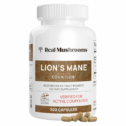How to Choose Good Mushroom Supplements
Not sure how to shop for high quality mushroom supplements?
Let’s dive in and cover how to sort out the good mushrooms from the bad!
We’ll cover the importance of things like beta-glucan content versus polysaccharides, why extraction method matters, and give you tips on what things to look for when shopping for popular mushroom varieties like Lion’s Mane and Turkey Tail.

We’ll even mention a couple of reputable brands and explain what makes them different than other brands on the market.
After reading this article, you’ll have more confidence in knowing if the mushroom supplement you’re buying is worth your hard earned cash!
In this article, we’ll cover the following:
Extracts and Mushroom Products
Choosing a mushroom extract product over one that contains actual mushrooms can offer several advantages.
Mushrooms contain chitin, a compound that our body cannot break down effectively, which can limit the release of bioactive compounds locked up in the chitin cell walls.
Mushroom extracts, on the other hand, undergo specific extraction processes that break down the chitin and release the desired bioactive compounds. This results in a concentrated form of targeted compounds, providing higher potency and more focused effects.
Extracts can be standardized to ensure consistent levels of key compounds, allowing for reliable dosing and predictable results. Moreover, the rigorous quality control measures applied to extracts ensure purity and potency.
The concentrated form of extracts facilitates better absorption by the body. Additionally, their smaller serving sizes offer convenience for daily consumption.
Overall, mushroom extracts provide a convenient and potent option to access the potential health benefits of mushrooms reliably and consistently.
When choosing a mushroom extract, it is important to consider the contents and extraction method to ensure the quality and effectiveness of the product.
Understanding Beta-Glucan Content vs. Polysaccharides
When it comes to mushroom supplements, understanding the difference between beta-glucan content and polysaccharides is essential.
Beta-glucans are the primary bio-active compounds responsible for beneficial properties of mushrooms (like immune-boosting effects from Turkey Tail or neurogenesis from Lion’s Mane), making them crucial for your health.
Polysaccharides, on the other hand, encompass a broader category that includes various compounds, some of which may not offer the same benefits.
All beta-glucans are polysaccharides, but not all polysaccharides are beta-glucans.
Focus on finding a supplement with higher beta-glucan content rather than just looking at the polysaccharide content or bio-mass content.
Good mushroom products can contain a beta-glucan content in the 30% range. This should be backed by a 3rd-party lab analysis and be clearly labeled on the product. Cheap brands that offer low-quality products will contain significantly less beta-glucans or not even disclose if it contains any at all!
Some supplement brands might list only the polysaccharide content or the biomass weight. This does not tell you how much of the “good stuff” is actually in the product.

For example, if this product contains 1.5g of Lion’s Mane, how much is actually mycelium (which is only one part of the mushroom and does not include the fruiting body) and how much is grain or brown rice filler? Is the entire substrate myceliated?
This would be similar to buying one gram of cannabis without knowing the THC% contents. Even worse, the soil or substrate the buds were grown in are included as part of the total weight that makes up that one gram.
Furthermore, It is also important to note that beta-glucans can come in both water-soluble and alcohol soluble (or “water-insoluble”) forms.
The concentration of the type of beta-glucans can be dependent on the extraction method.
Shopping for Specific Mushroom Varieties
When it comes to selecting mushroom supplements, two popular varieties to consider are Lion’s Mane and Turkey Tail mushrooms.
Here’s what you should keep in mind when shopping for these functional fungi:
Beta-Glucan Content and Transparency
Look for supplements that clearly state the beta-glucan content on the label. A reputable brand will provide this information.

Aim for a supplement with a good beta-glucan content, such as around 30% or higher. This ensures a potent and effective product.
Fruiting Body vs. Mycelium Extract
It’s often best to choose mushrooms supplements made from the fruiting body of the mushroom rather than mycelium alone. In many cases, the fruiting body contains higher concentrations of beneficial compounds.
There’s an ongoing debate on whether extracts made from fruiting bodies or the mycelium of mushrooms is more beneficial.
One of the main concerns with mycelium-based products is the potential inclusion of non-beneficial “filler” without bioactive compounds.
For instance, if mycelium is cultivated on a substrate like grain, it is crucial for the grain to be fully myceliated.
However, inexpensive and low-quality products may grind up both mycelium and grain together, resulting in a mixture that may contain a significant amount of polysaccharides that are not beta-glucans. In this case, the brand may only tell you the total weight by “biomass”.
Check that the supplement explicitly states the use of the fruiting body in the extraction process.
Extraction Method
Consider the extraction method used by the brand.
Dual extraction, which involves both hot water and alcohol extraction, is ideal for extracting a broad spectrum of beneficial compounds.
Dual extracted products will often be labeled as 1:1, for example, which means for every one pound of product, it should contain one pound of extract.
Some mushrooms in particular, such as Lion’s Mane and Cordyceps, are best suited for hot water extraction that is unfiltered.
Some of bio-active compounds will not dissolve in water, but will still be present in the final product if it is left unfiltered (which is a good thing).
Because the hot water extract is not filtered, it is not as concentrated as an 8:1 product for example.
However, this does not mean that the product lacks all the “good stuff”.
Essentially, the hot water melts or breaks down the chitin cell walls, which frees up the beneficial compounds that were locked up.
The water-insoluble (or alcohol-soluble) compounds are then left floating in the extract. Once dried, the final product will contain a broad spectrum of beneficial compounds.
This is not the case if the hot water extract is filtered out.
Third-Party Testing and Quality Assurance
Prioritize brands that conduct third-party testing. This ensures that the supplement undergoes rigorous quality checks for purity and potency.
Look for information on the brand’s testing practices and certifications, as this demonstrates their commitment to producing high-quality products.
Does the label say it’s lab-tested but then there’s no actual lab information listed?
Reputable Brands
Consider trusted brands like Oriveda and Real Mushrooms (Nammex), which have established themselves as leaders in the mushroom supplement market.
These brands prioritize quality, transparency, and consumer satisfaction, making them reliable choices for Lion’s Mane and Turkey Tail supplements.
Nammex is a manufacturer that supplies mushroom products to various brands, including the Real Mushroom brand, which repackages and sells them.
These brands provide real lab analysis reports and specify important facts such as beta-glucan contents, extraction method, and which parts of the mushroom used.
Why Tinctures May Not Be Ideal
While tinctures have their advantages, they may not always be the best option for mushroom supplements. Here’s why:
- Limited bioavailability: Tinctures, being alcohol-based extracts, may not extract all beneficial compounds effectively, leading to reduced bioavailability.
- Variable potency: It’s challenging to determine the exact dosage of active compounds in tinctures due to inconsistent concentration across batches.
- Taste and convenience: Tinctures often have a strong, bitter taste, which may not suit everyone’s palate. Additionally, they may not be as convenient for daily use as capsules or powders.
Identifying and Avoiding Certain Mushroom Supplement Brands
To ensure you choose a reliable mushroom supplement brand, watch out for these red flags:
- Lack of transparency: Brands that don’t provide detailed information about sourcing, extraction methods, and testing practices should be approached with caution. Products should be clearly labeled with contents
- Absence of third-party testing: Reputable brands prioritize third-party testing to guarantee quality and purity. Avoid brands that don’t conduct or disclose this testing.
- Unrealistic claims: Brands making extravagant, unsupported claims about their mushroom supplements should be viewed skeptically. Look for scientific references and reputable certifications.
- Poor customer reviews and feedback: Take the time to read customer reviews and testimonials. Consistently negative feedback regarding product quality or customer service is a warning sign.



